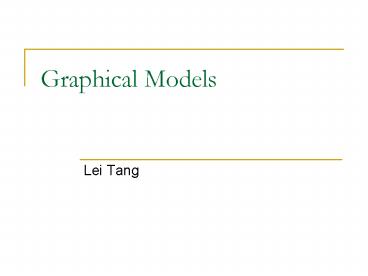Graphical Models - PowerPoint PPT Presentation
Title:
Graphical Models
Description:
... Bayesian Network, Belief Network) Typically used to represent causal relationship Undirected Graph (Markov Random Field, Markov Network) ... – PowerPoint PPT presentation
Number of Views:111
Avg rating:3.0/5.0
Title: Graphical Models
1
Graphical Models
- Lei Tang
2
Review of Graphical Models
- Directed Graph (DAG, Bayesian Network, Belief
Network) - Typically used to represent causal relationship
- Undirected Graph (Markov Random Field, Markov
Network) - Usually when the relationship between variables
are not very clear.
3
Some rules(1)
- A graph to represent a regression problem
- Plate is used to represent repetition.
4
Some rules(2)
- Suppose we have some parameters
- Observations are shaded.
5
Model Representation (DAG)
- Usually, the higher-numbered variables
corresponds to terminal nodes of the graph,
representing the observations Lower-numbered
nodes are latent variables. - A graph representing the naïve Bayes model.
6
Factorization
- For directed graph
- (Ancestral Sampling)
- For undirected graph
Potential Function
Partition Function
Energy Function
7
Directed-gt Undirected Graph
8
Moralization (marrying the parents)
Moralization adds the fewest extra links but
remains the maximum number of independence
properties.
9
Perfect Map
- Every independence property of the distribution
is reflected in the graph and vice versa, then
the graph is a perfect map. - Not all directed graph can not be represented as
undirected graph. (As in previous example) - Not all undirected graph can be represented as
directed graph.
10
Inference on a Chain(1)
N variables, each one has K states, then
O(K(N-1))
11
Inference on a Chain(2)
Complexity O( KN)
12
Inference on a Chain(3)
Message Passed forwards along the chain
Message Passed backwards along the chain
13
Inference on a Chain(4)
- This message passing is more efficient to find
the marginal distributions of all variables. - If some of the nodes in the graph are observed,
then there is no summation for the corresponding
variable. - If some parameters are not observed, apply EM
algorithm (discussed later)
14
Factor Graph
- We can apply similar strategy (message passing)
to undirected/directed trees and polytrees as
well. - Polytree is a tree that one node has two or more
parents. - In a factor graph, a node (circle) represents a
variable, and additional nodes (squares)
represents a factor.
15
Factor Graph is not unique
16
A poly tree example
It is still a tree without loops!!
17
The sum-product algorithm
- This algorithm is the same as belief propagation
which is proposed for directed graphs without
loops.
18
An intuitive Example
19
(No Transcript)
20
(No Transcript)
21
in General Graphs
- Exact Inference Junction tree algorithm.
- Inexact inference
- No closed form for the distribution.
- Dimensionality of latent space is too high.































